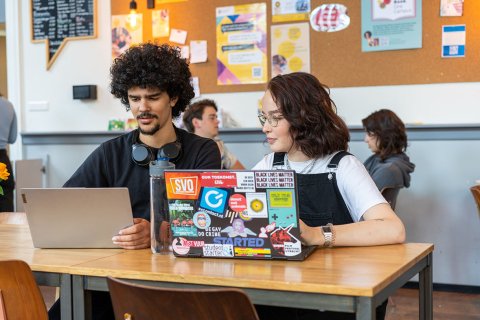Study programme
The research Master's programme Philosophy comprises two years (120 EC). Each year is divided into two semesters, running from September to January and from February to June. A semester is divided into two study periods.
Curriculum
The programma consists of compulsory and restricted choice elements, plus free choice. Check the study schedule (PDF).
Compulsory
- Two Core Seminars, in theoretical philosophy, history of philosophy, and practical philosophy.
- Two years of participation in the Research Colloquium, including regular meetings with the research staff of our area of specialisation.
- Master’s thesis.
Restricted choice elements
- At least four Topics Seminars.
- One Interdisciplinary Research Area course, for example The History and Philosophy of Objectivity.
Free choice
- At least two tutorials, small groups of students focused on a specialised research topic.
- Research School Seminars coordinated by the national Research School in Philosophy, selected from course offerings in all the Dutch research Master's programmes.
- Electives freely chosen from graduate course offerings, or internships.
Note: students can automatically substitute a semester of Study Abroad for two Topics Seminars, one Tutorial, one year of Research Colloquium and two electives.

Educational methods
- lectures (10%)
- seminars (65%)
- self-study (25%)
- internship (optional)
Some courses include a lecture component, but most classes revolve around discussing philosophical texts and issues. A member of our staff will advise you during your thesis, but you will carry it out independently on a topic of your choice.
Internship
You have the possibility to do an internship. Preferably, you would take part in an on-going research project. Keep in mind that most organisations in the Netherlands use Dutch as their working language. However, you can also do an internship abroad, at a research project at a university or at an international organisation.
Examinations
- final research papers
- short papers or written exams
- in-class presentations
- active participation and concluding report
- thesis (approximately 30,000 words)
Extracurricular opportunities
Are you looking for an extra challenge?
For students looking for an extra challenge in addition to their Master's, there are several options. Utrecht University offers several honours programmes for students looking for an extra challenge. Honours education is followed on top of your regular Master's programme and goes beyond the regular curriculum. Honours programmes are available at interdisciplinary level and allow you to work on projects that transcend your own discipline.

